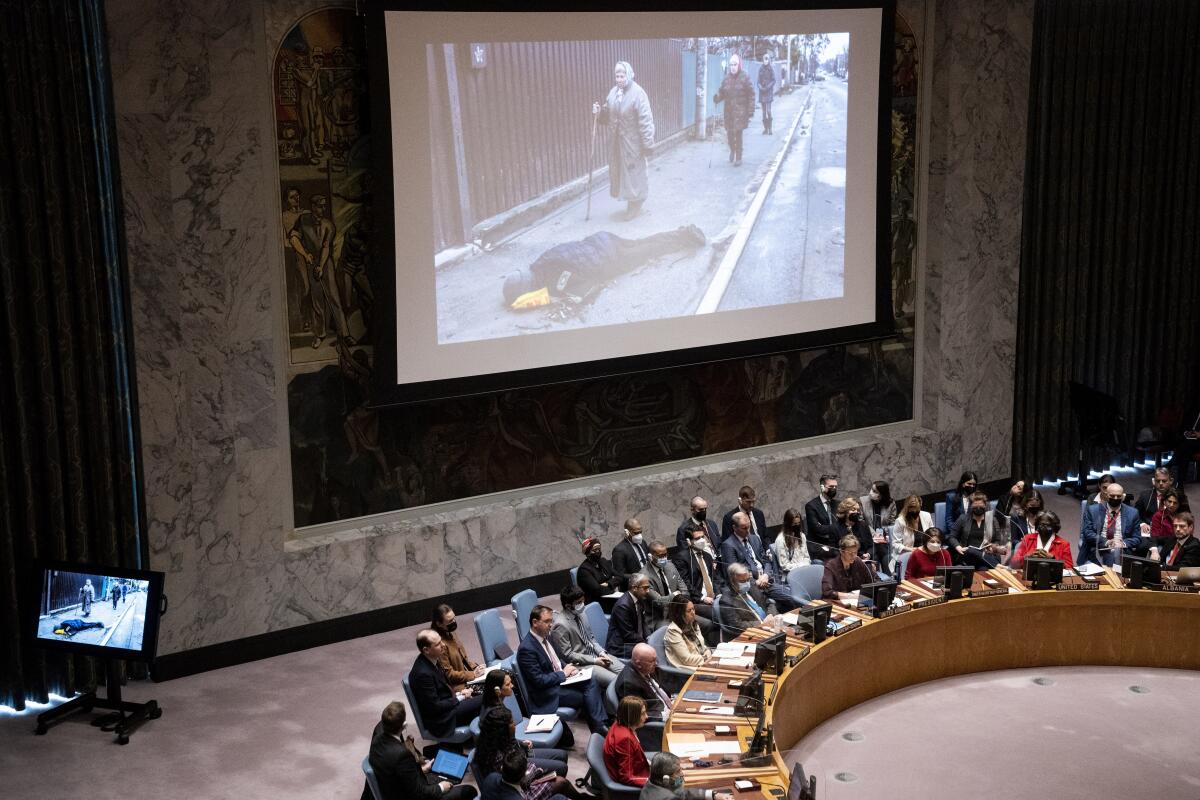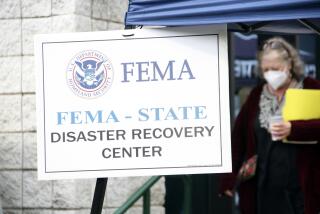Op-Ed: Radical honesty is the antidote to Russian disinformation

Much of the Western world has been horrified by recent reports of Russian atrocities in cities like Bucha, which have included widespread bombings of homes and public buildings like hospitals; sexual assaults of Ukrainians by Russian soldiers; and the systematic murder of civilians, including people who were bound before being executed. The Russian population, in contrast, appears to increasingly support the war and even sees their nation’s unprovoked attack on Ukraine as a defensive response to Western aggression.
How is this possible? One reason has been the effectiveness of the Russian media to spread misinformation. These efforts have ramped up and evolved during the course of the country’s war on Ukraine. One early example of this is Russian claims that Ukrainian facilities were creating biological weapons with American assistance. Another example was evident in Russian President Vladimir Putin’s assertions that the Russian special military operation was an effort to “denazify” the country and to stop a genocide in eastern Ukraine — a chilling foreshadowing to be sure.
The most recent disinformation, following the Bucha massacre, is also the most heart-wrenching. Gruesome images and accounts of indiscriminate rape, torture and murder of civilians continue to emerge. Evidence clearly shows that Russian forces are responsible for these attacks, yet Russian state media coverage unashamedly reports that the massacre was carried out by Ukraine’s own military. Undeterred, the Kremlin has denied responsibility for the massacre, alleging that the dead bodies had been staged, weren’t actually dead and did not even appear until after Russian troops left the area. Tellingly, the Russian coverage has even included English subtitles, making the reporting more accessible to Western audiences who may be sympathetic to the Kremlin’s cause.
Such disinformation is difficult to counter. For starters, Russian government agencies have proved exceptionally adept at psychological manipulation of events in real time. Social media and the internet have propelled disinformation efforts at incredible rates that ensure that Russian campaigns can be fast, first and widely shared.
Second, the intended audiences of disinformation efforts vary, and so do the remedies for combating the campaigns. In the early days of Russia’s war on Ukraine, the Biden administration and others in the West called on Russians to protest, attempt a coup or even assassinate Putin. Soon after the invasion began, however, the Kremlin has stepped up monitoring of the internet and has cut off multiple social media platforms, with the exceptions of Russia’s VKontakte and TikTok. Moscow’s regulation of the internet goes back roughly 10 years, and this, coupled with the blocking of social media, has ensured that Russia can tightly control what information its citizens can access, including counternarratives to the stories pushed on state television.
Meanwhile, when it comes to disputing disinformation in democratic states, with greater access to information and various media sources, different challenges exist. Where free and open discourse is the norm, cracking down on various narratives and users runs counter to political and civil rights. Some platforms and governments have nonetheless limited access, but this remains a difficult task in those states where free expression is protected.
Third, in terms of the sheer volume of users, here again Russian actions are exceptionally difficult to thwart because of the staggering number of accounts and users involved. Banning users who spread disinformation is rarely a sufficient response when new accounts can be created easily. The Kremlin has vast networks of trolls and bot farms at work spreading these messages.
Transparency by Ukraine and the West about what is really going on, and other forms of multilateral cooperation, represents powerful antidotes to the ongoing psychological warfare. Candid communication has been on display in many ways throughout the Ukrainian and American responses.
In the days leading up to the invasion, American and British intelligence agencies provided numerous reports of the impending attacks — in part to discredit Russian plans to launch a “false flag” operation in eastern Ukraine, which could serve as pretext for the war. Before the invasion, the Biden administration provided regular updates — sometimes featuring recently declassified materials — designed to call out Russian troop movements, Putin’s perceived objectives and the impending consequences of crossing Ukraine’s border.
Coordinated actions like Thursday’s vote by U.N. members to suspend Russia from the Human Rights Council also send a strong message.
Ukrainian President Volodymyr Zelensky has himself become a symbol of transparency and cooperation, by making regular public addresses to Western nations and Ukrainians. These speeches have renewed his citizens’ courage during the dark days of this conflict and have offered rebuttals to Russian claims. Zelensky’s address to the United Nations this week recounted the horrors uncovered in Bucha, and now that Russian troops are out of the area we can expect even more nightmarish revelations. The gravity of this speech continues efforts to counter Russian disinformation and could very well provide international organizations and Ukraine’s allies with justification to continue to sanction the Kremlin.
Transparency alone is not enough to end the horrors of the war, but it has offered a way to frame issues before Russian media, trolls and bots can set the narrative. This is crucial to forging a sustainable coalition and has been key to shaping a different global response to Russia’s invasion this year than to the 2014 annexation of Crimea.
Reports of the Bucha massacre will undoubtedly test the resolve and determination of Ukraine and its allies. So will future reports that uncover the aftermath in places like Mariupol. Nonetheless, Russian disinformation will not let up as the footage from these horrific events continues to circulate and invoke widespread condemnation. Transparent communication and multilateral cooperation can continue to provide Ukrainian forces the support that they need, while also continuing to weaken Russia.
Joseph Robbins researches post-Communist party-system development and the consequences of terrorist attacks. @JosephWRobbins
More to Read
A cure for the common opinion
Get thought-provoking perspectives with our weekly newsletter.
You may occasionally receive promotional content from the Los Angeles Times.










